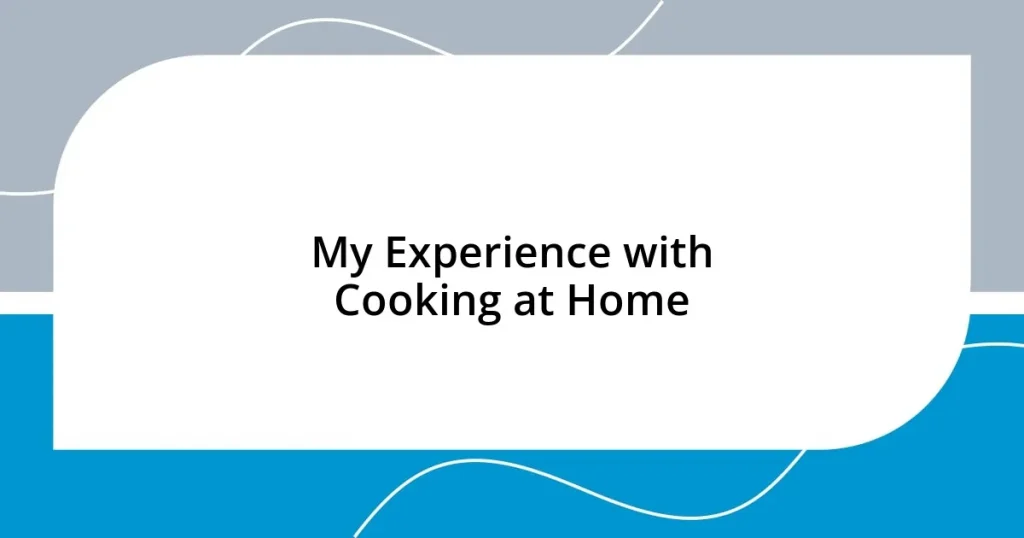Key takeaways:
- Cooking is about experimentation and adjusting; mistakes can lead to valuable lessons and creativity.
- Essential kitchen tools, like a sharp chef’s knife and sturdy cutting boards, enhance the cooking experience.
- Meal planning saves time and encourages trying new recipes, while flexibility allows for enjoyment in the process.
- Overcoming cooking challenges fosters resilience and patience, turning potential disasters into rewarding experiences.
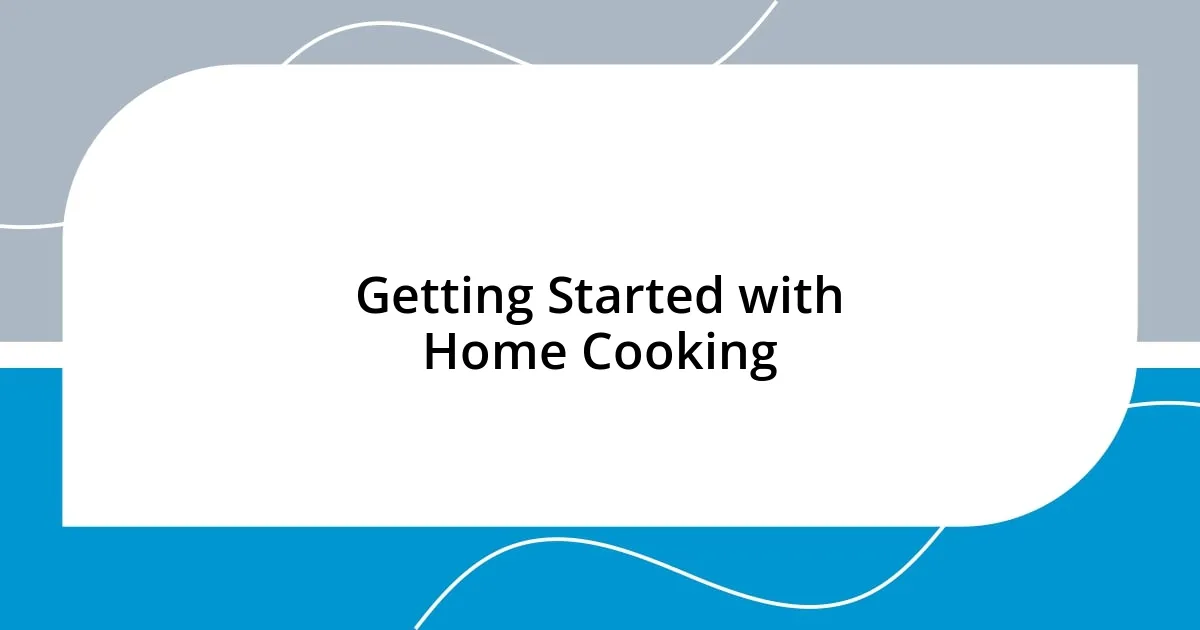
Getting Started with Home Cooking
Starting out in the kitchen can feel a bit daunting, can’t it? I remember my first attempt at making spaghetti—I had this vision of a perfect plate, but the sauce ended up too watery. Instead of giving up, I figured out that I could simply simmer it longer. That little mistake turned into a valuable lesson: cooking is often about adjusting and experimenting.
One of the best parts of cooking at home is the ability to personalize your dishes. I often think about how cooking welcomes creativity. For example, one evening, I was low on groceries but hungry for something comforting. I tossed together some leftover rice, vegetables, and that half-used can of coconut milk. It became a surprising favorite! I find that such moments inspire confidence and make you realize that cooking doesn’t always require a formal recipe—your intuition can guide you just as well.
As you step into the world of home cooking, I encourage you to embrace the inevitable mishaps. Have you ever burnt toast? I sure did, and from that moment on, I learned to never leave the kitchen while something’s on the stove. It’s these little experiences that teach you to be mindful and engaged, turning cooking into a rewarding journey rather than just a chore.
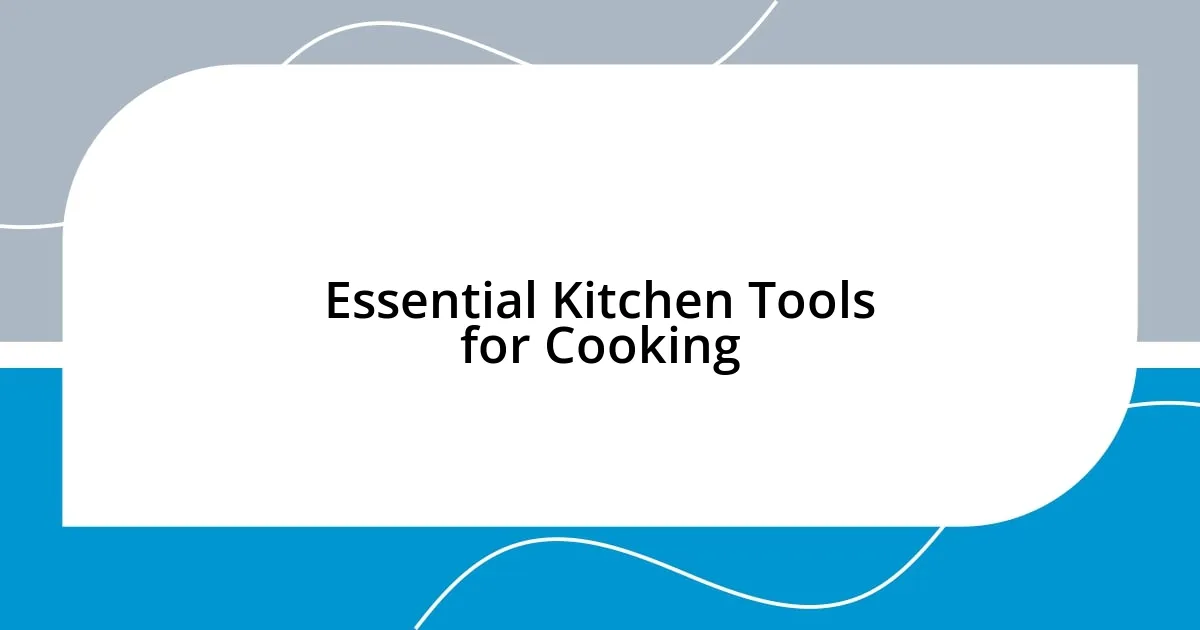
Essential Kitchen Tools for Cooking
When it comes to cooking at home, having the right tools can make all the difference in your experience. I vividly remember the day I finally invested in a good quality chef’s knife. The first time I sliced through vegetables with ease, I felt like a true culinary artist. A sharp knife not only makes prep work faster and safer but also elevates the quality of your dishes, turning even the simplest ingredients into something special.
Another essential tool I can’t live without is a sturdy cutting board. I opted for a wooden one after realizing how much better it felt under my knife compared to plastic. Plus, it adds a touch of warmth to the kitchen. There’s something satisfying about chopping ingredients on a board that looks and feels inviting. I also appreciate how easy it is to keep clean and how it can serve as a rustic serving platter when I have friends over for dinner.
Lastly, don’t underestimate the joy of having quality pots and pans. I remember the first time I made a stir-fry in a heavy skillet; the way everything cooked evenly was a revelation. Investing in good cookware means that your meals will turn out consistently delicious. And honestly, who doesn’t love the sound of sizzling ingredients? For me, it’s like music to my ears and a reminder that I’m creating something nourishing and delightful.
| Kitchen Tool | Importance |
|---|---|
| Chef’s Knife | Essential for easy and safe food preparation |
| Cutting Board | Provides a stable surface and can enhance kitchen aesthetics |
| Pots and Pans | Crucial for even cooking and flavor development |
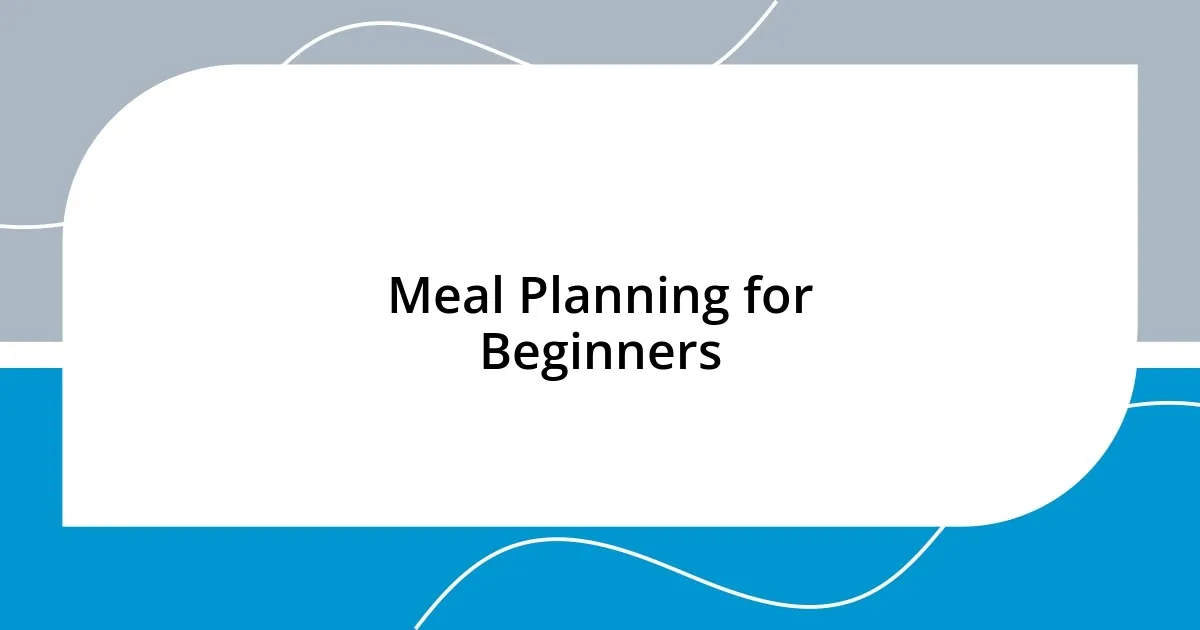
Meal Planning for Beginners
Meal planning can feel like a mysterious art, especially for beginners. I remember the first time I sat down with a notepad, determined to organize my week’s meals. It was such a gratifying experience! I ended up with a colorful list, and surprisingly, I found it enjoyable to think about different flavors and combinations. Planning ahead didn’t just save me time during the busy week; it also encouraged me to try new recipes that I might have otherwise overlooked in a busy moment.
Here are some helpful tips to get started on meal planning:
- Set aside time weekly: Designate a specific day to plan meals and make a grocery list; this gives structure to your week.
- Choose recipes: Select a mix of tried-and-true favorites and new dishes to keep things exciting.
- Make a grocery list: Write down everything you need for your planned meals, which can help minimize impulsive buying.
- Prep ahead: If possible, prepare some ingredients in advance, like chopping vegetables or marinating proteins, to streamline cooking during the week.
- Stay flexible: It’s okay to swap meals around based on your mood or unexpected cravings; the goal is to enjoy the process as much as the food itself!
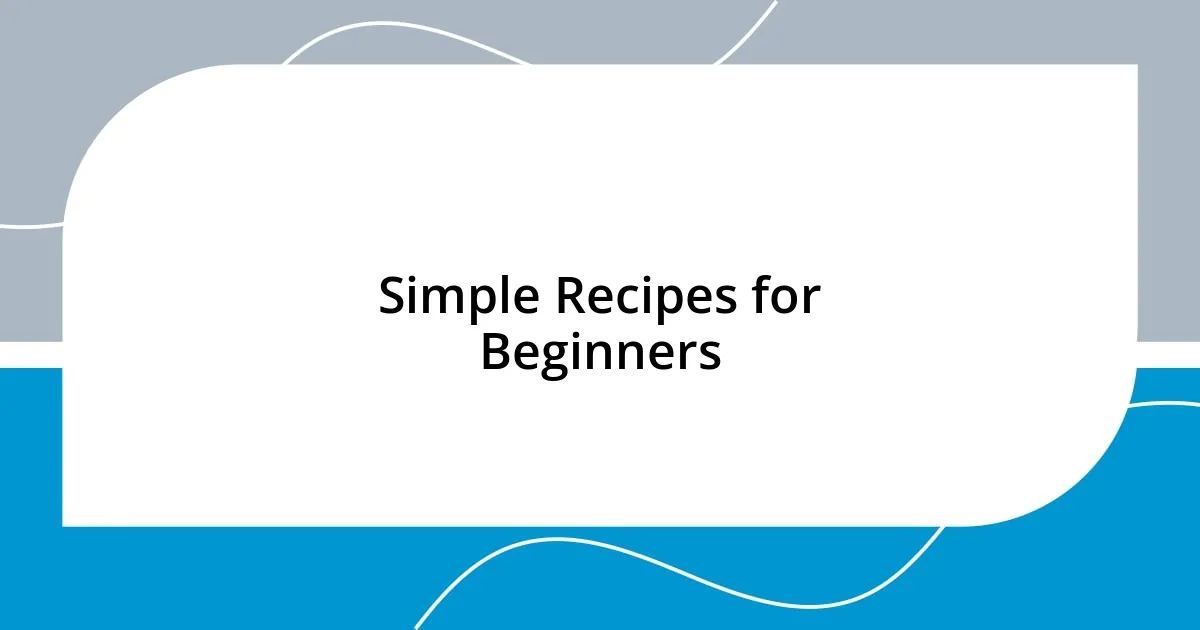
Simple Recipes for Beginners
When I think about simple recipes for beginners, my mind immediately goes to the classic scrambled eggs. I remember my first attempt—a bit of butter in the pan, a quick whisk of eggs, and within minutes, I had a fluffy breakfast that felt like magic. It’s such a rewarding dish because it not only teaches basic cooking techniques but also allows for creativity; you can toss in cheese, herbs, or leftover veggies to make it your own.
Another crowd-pleaser is pasta with marinara sauce. The first time I made it, I followed a recipe like a treasure map, carefully measuring each ingredient. But soon, I discovered that it’s all about adjusting to your taste. A pinch of red pepper flakes or a sprinkle of fresh basil can elevate a simple meal into something special. Isn’t it amazing how just a few basic ingredients can come together to create something delicious and satisfying?
Let’s not forget about stir-fried vegetables—it’s a favorite of mine that’s incredibly versatile. I remember tossing in whatever I had in the fridge: bell peppers, broccoli, and carrots, all sautéed with a dash of soy sauce. It was an exhilarating moment to see the vibrant colors come together in the pan. Cooking like this made me appreciate seasonal produce and inspired me to explore new combinations. Have you ever felt that joy when you unexpectedly discover a dish that resonates with you?
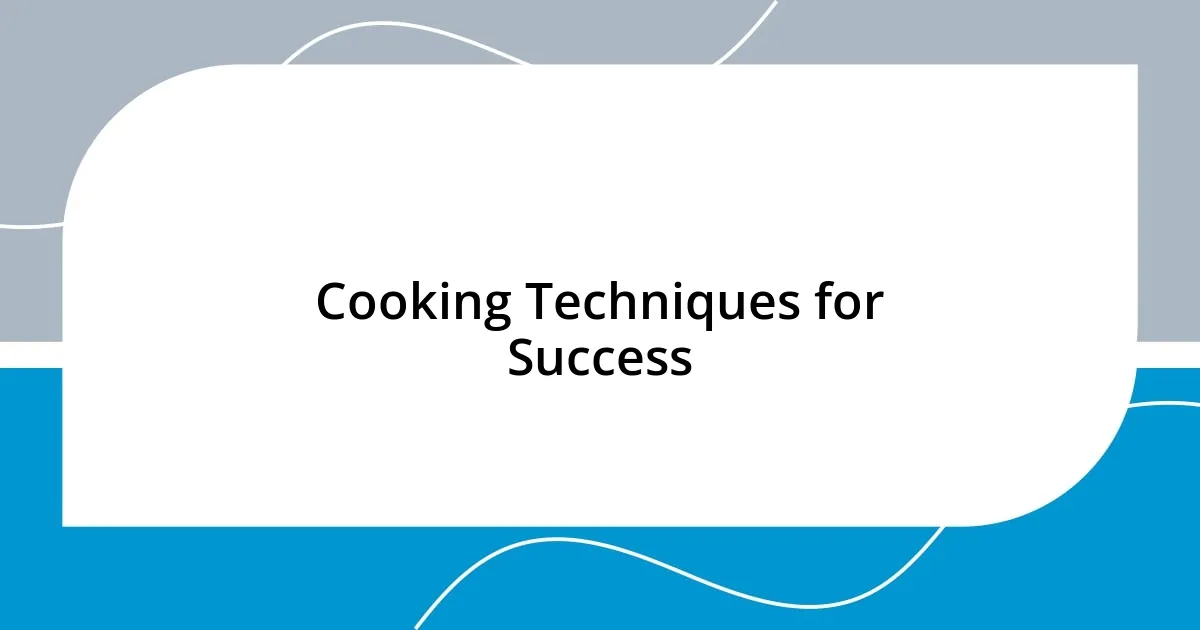
Cooking Techniques for Success
When it comes to mastering cooking techniques, I’ve found that timing can make all the difference. I vividly remember my early attempts at roasting vegetables, where I’d get so caught up in excitement that I’d forget to check the clock. The result? A blend of charred bits and undercooked pieces, which nearly ended my veggie enthusiasm! Learning to use a timer transformed my cooking journey; now, I savor perfectly caramelized Brussels sprouts and roasted sweet potatoes every time.
Another technique worth discussing is knife skills. I still recall the first time I learned to julienne vegetables—it felt like a rite of passage! The precise cuts allowed me to appreciate the textures and colors of each ingredient. Plus, working with a well-maintained knife not only makes cooking safer but also increases my efficiency in the kitchen. Have you ever experienced that satisfying crunch of a freshly cut carrot? It’s a small joy that adds to the cooking experience.
Lastly, one of my favorite techniques is mise en place, which means having everything in its place. Whenever I engage in this practice, I enjoy a sense of order that sets a positive tone for my cooking experience. I’ll slice, measure, and arrange all my ingredients before I even turn on the stove. This way, I feel calm and ready, and I often reflect on how much more enjoyable the process is when things are organized. Have you tried this method? I’d recommend it to anyone looking to enhance their culinary confidence and creativity.
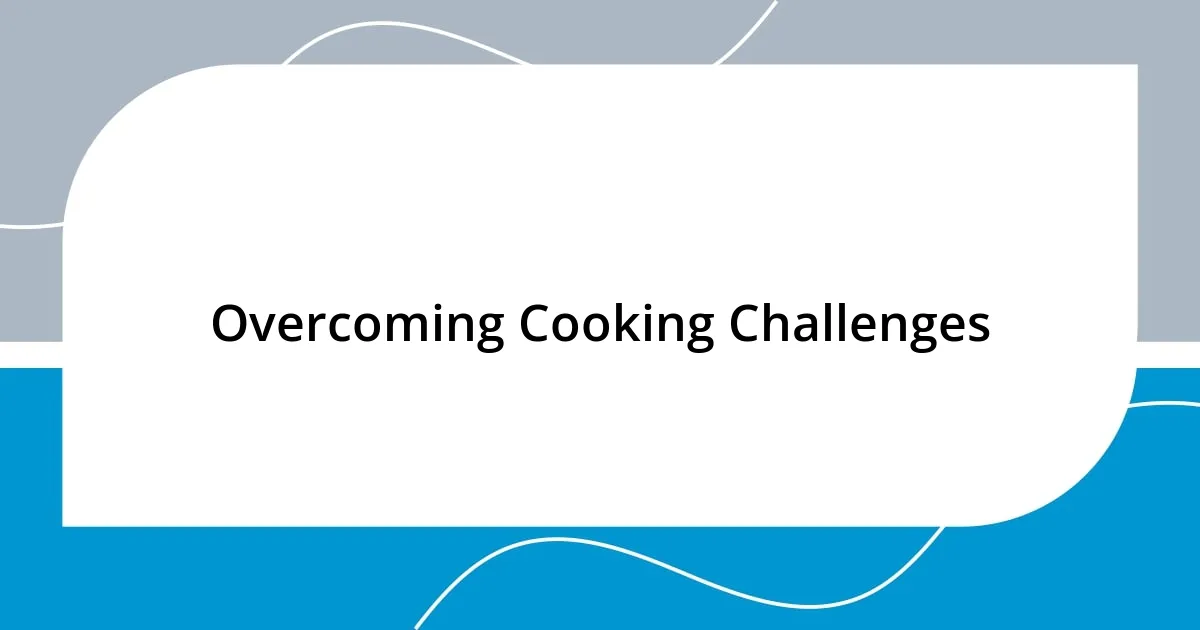
Overcoming Cooking Challenges
Cooking can be a rollercoaster of emotions, especially when faced with unexpected challenges. I vividly remember one evening when I was deep into preparing a new recipe and realized halfway through that I was missing a key ingredient—basil! Instead of panicking, I took a moment to think through my options. Rummaging through the pantry, I grabbed some pesto instead, and to my surprise, it added a delightful twist. Have you ever found a clever substitute that turned a potential disaster into a delicious surprise?
Then there’s the issue of kitchen mishaps. I’ve had my fair share of spills and splatters. One memorable incident involved a blender that decided to launch my smooth soup all over the counter. I had to take a deep breath, wipe it down, and remind myself that every mistake is a lesson. It’s a testament to how cooking is as much about resilience as it is about precision. How do you handle those unexpected moments in your own cooking?
Lastly, patience is a skill I’ve learned to embrace. I recall a time when I was overly eager to taste my caramel sauce too soon, which led to a sugary disaster instead of the beautiful golden color I was aiming for. That day taught me the importance of giving ingredients the time they need to develop their flavors and textures. Cooking, after all, is about savoring the process as much as the final result. What challenges have you faced that taught you the value of patience?
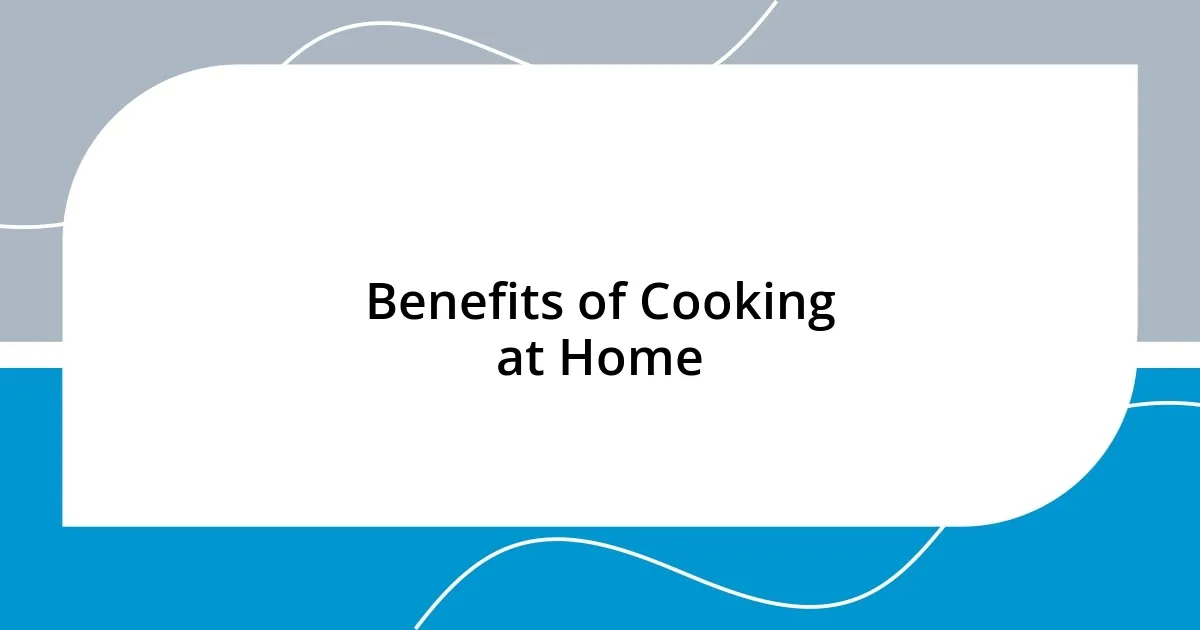
Benefits of Cooking at Home
Cooking at home offers a wealth of benefits that often go unnoticed. For instance, one of the most rewarding aspects for me has been the opportunity to experiment with flavors. I remember the first time I tried to recreate a dish I loved from a restaurant. Not only did it spark my creativity, but it also allowed me to adjust the ingredients to my taste. Have you ever modified a recipe to make it your own? That sense of personalization truly enhances the cooking experience.
Another significant advantage is the control over nutrition. I often find myself considering what goes into my meals, aiming for healthier options. One evening, I decided to swap out cream for Greek yogurt in my pasta dish, which turned out both lighter and just as creamy! It led me to reflect on how cooking at home has empowered me to make nourishing choices. How often do you think about the nutritional value of your meals?
Lastly, there’s an undeniable sense of accomplishment that washes over me after a successful home-cooked meal. I distinctly remember the pride I felt when I whipped up a complex curry from scratch. It was exhausting, yet incredibly satisfying to see the blend of spices and ingredients transform into something delicious. That moment reminded me of the joy that comes from crafting a meal with love and intention. Isn’t it amazing how cooking can connect us to our emotions and memories?











